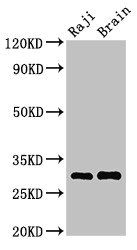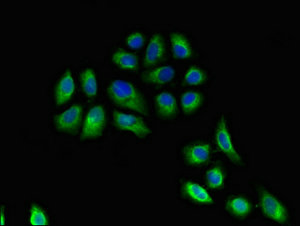HLA-DRB3 Antibody
-
货号:CSB-PA302920LA01HU
-
规格:¥440
-
促销:
-
图片:
-
Western Blot
Positive WB detected in: Raji whole cell lysate, Mouse brain tissue
All lanes: HLA-DRB3 antibody at 3.5µg/ml
Secondary
Goat polyclonal to rabbit IgG at 1/50000 dilution
Predicted band size: 30 kDa
Observed band size: 30 kDa -
Immunofluorescent analysis of A549 cells using CSB-PA302920LA01HU at dilution of 1:100 and Alexa Fluor 488-congugated AffiniPure Goat Anti-Rabbit IgG(H+L)
-
-
其他:
产品详情
-
产品名称:Rabbit anti-Homo sapiens (Human) HLA-DRB3 Polyclonal antibody
-
Uniprot No.:P79483
-
基因名:
-
别名:DR beta 3 chain antibody; DR7 antibody; DRB3_HUMAN antibody; HLA class II histocompatibility antigen antibody; HLA class II histocompatibility antigen DR beta 3 chain antibody; HLA class II histocompatibility antigen DRB1 7 beta chain antibody; HLA DR3B antibody; HLA-DRB3 antibody; Human leucocyte antigen DRB3 antibody; Major histocompatibility complex class II DR beta 3 antibody; MGC117330 antibody; MHC class II antigen DR beta 3 chain antibody; MHC class II antigen DRB3 antibody; MHC class II HLA DR beta 3 chain antibody
-
宿主:Rabbit
-
反应种属:Human, Mouse
-
免疫原:Recombinant Human HLA class II histocompatibility antigen, DR beta 3 chain protein (111-227AA)
-
免疫原种属:Homo sapiens (Human)
-
标记方式:Non-conjugated
本页面中的产品,HLA-DRB3 Antibody (CSB-PA302920LA01HU),的标记方式是Non-conjugated。对于HLA-DRB3 Antibody,我们还提供其他标记。见下表:
-
克隆类型:Polyclonal
-
抗体亚型:IgG
-
纯化方式:>95%, Protein G purified
-
浓度:It differs from different batches. Please contact us to confirm it.
-
保存缓冲液:Preservative: 0.03% Proclin 300
Constituents: 50% Glycerol, 0.01M PBS, pH 7.4 -
产品提供形式:Liquid
-
应用范围:ELISA, WB, IF
-
推荐稀释比:
Application Recommended Dilution WB 1:500-1:5000 IF 1:50-1:200 -
Protocols:
-
储存条件:Upon receipt, store at -20°C or -80°C. Avoid repeated freeze.
-
货期:Basically, we can dispatch the products out in 1-3 working days after receiving your orders. Delivery time maybe differs from different purchasing way or location, please kindly consult your local distributors for specific delivery time.
相关产品
靶点详情
-
功能:A beta chain of antigen-presenting major histocompatibility complex class II (MHCII) molecule. In complex with the alpha chain HLA-DRA, displays antigenic peptides on professional antigen presenting cells (APCs) for recognition by alpha-beta T cell receptor (TCR) on HLA-DRB3-restricted CD4-positive T cells. This guides antigen-specific T-helper effector functions, both antibody-mediated immune response and macrophage activation, to ultimately eliminate the infectious agents and transformed cells. Typically presents extracellular peptide antigens of 10 to 30 amino acids that arise from proteolysis of endocytosed antigens in lysosomes. In the tumor microenvironment, presents antigenic peptides that are primarily generated in tumor-resident APCs likely via phagocytosis of apoptotic tumor cells or macropinocytosis of secreted tumor proteins. Presents peptides derived from intracellular proteins that are trapped in autolysosomes after macroautophagy, a mechanism especially relevant for T cell selection in the thymus and central immune tolerance. The selection of the immunodominant epitopes follows two processing modes: 'bind first, cut/trim later' for pathogen-derived antigenic peptides and 'cut first, bind later' for autoantigens/self-peptides. The anchor residue at position 1 of the peptide N-terminus, usually a large hydrophobic residue, is essential for high affinity interaction with MHCII molecules.; ALLELE DRB3*01:01: Exclusively presents several immunogenic epitopes derived from C. tetani neurotoxin tetX, playing a significant role in immune recognition and long-term protection. Presents viral epitopes derived from HHV-6B U11, TRX2/U56 and U85 antigens to polyfunctional CD4-positive T cells with cytotoxic activity implicated in control of HHV-6B infection.; ALLELE DRB3*02:02 Exclusively presents several immunogenic epitopes derived from C. tetani neurotoxin tetX, playing a significant role in immune recognition and long-term protection. Upon EBV infection, presents to CD4-positive T cells latent antigen EBNA2 (PRSPTVFYNIPPMPLPPSQL) and lytic antigen BZLF1 (LTAYHVSTAPTGSWF) peptides, driving oligoclonal expansion and selection of virus-specific memory T cell subsets with cytotoxic potential to directly eliminate virus-infected B cells. Presents viral epitopes derived from HHV-6B U11, gB/U39 and gH/U48 antigens to polyfunctional CD4-positive T cells with cytotoxic activity implicated in control of HHV-6B infection. Plays a minor role in CD4-positive T cell immune response against Dengue virus by presenting conserved peptides from capsid and non-structural NS3 proteins. Displays peptides derived from IAV matrix protein M, implying a role in protection against IAV infection. In the context of tumor immunesurveillance, may present to T-helper 1 cells an immunogenic epitope derived from tumor-associated antigen WT1 (KRYFKLSHLQMHSRKH), likely providing for effective antitumor immunity in a wide range of solid and hematological malignancies. Presents to Vbeta2-positive T-helper 1 cells specifically an immunodominant peptide derived from tumor antigen CTAG1A/NY-ESO-1(PGVLLKEFTVSGNILTIRLTAADHR) and confers protective memory response. In metastatic epithelial tumors, presents to intratumoral CD4-positive T cells a TP53 neoantigen (HYNYMCNSSCMGSMNRRPILTIITL) carrying G245S hotspot driver mutation and may mediate tumor regression.; ALLELE DRB3*03:01: Presents a series of conserved peptides derived from the M. tuberculosis PPE family of proteins, in particular PPE29 and PPE33, known to be highly immunogenic. Presents immunogenic epitopes derived from C. tetani neurotoxin tetX, playing a role in immune recognition and long-term protection. Displays immunodominant viral peptides from HCV non-structural protein NS2, as part of a broad range T-helper response to resolve infection.
-
基因功能参考文献:
- In contrast to HLA-DRB4*01:01P, the inheritance of HLA-DRB3*01:01 is strongly associated with the propensity for mounting a humoral immune response against fetal HPA-1a antigen. PMID: 28019029
- The first time that the haplotypes A33-DR3 and A33-DR9 were found with an enhanced predisposition to type 1 diabetes in Han Chinese. PMID: 27181214
- HLA-DRB3 affects type 1 diabetes risk and islet autoantibodies. PMID: 26740600
- this mouse model unravels a critical role for HLA-DR3 in generating an autoimmune response to SmD and lupus nephritis in the NZM2328 background. PMID: 26475924
- Haplotyping was done on 91 Southern Europe celiac patients. HLA-DR3-DQ2 without HLA-DR7-DQ2 was present in 62.6%, HLA-DR7-DQ2 without HLA-DR3-DQ2 was present in 16.5% and HLA-DR4-DQ8 without HLA-DQ2 was present in 3.3%. PMID: 24628273
- Children with the HLA haplotype DR3-DQ2, especially homozygotes, were found to be at high risk for celiac disease autoimmunity and celiac disease early in childhood. PMID: 24988556
- HLA-DRB3*02:02 on the DRB1*03:01 haplotype can contribute to type 1 diabetes risk. PMID: 23462545
- Three sets of HLA-DR3-positive haplotypes are designed that provide maximum risk of type 1 diabetes development in Indians and suggest a common Caucasian ancestor from which multiple haplotypes evolve independently. PMID: 23387390
- Heterozygosity of HLA-DRB3*01:01 and HLA-DRB4*01:01 as a potential predictor of fetal neonatal alloimmune thrombocytopenia. PMID: 22671039
- There was a strong sporadic inclusion body myositis association with the carriage of the DRB3*01:01 allele which was accounted for by its linkage disequilibrium with DRB1*03:01. PMID: 23010279
- TNF associations with type 1 diabetes are caused by their linkage disequilibrium with specific HLA-DR3-DQ2 haplotypes in the Indian population. PMID: 22366579
- In addition to confirming one of the top findings in the meta-analysis, TRIM26, RNF5 and HLA-DRB3 have been identified as potential candidate genes for schizophrenia. PMID: 22433715
- There are no significant differences in the HLA-DRB3/B4/B5 homozygosity and heterozygosity rates between Korean males and females in both newborns and adults. PMID: 22531795
- All patients with sporadic inclusion body myositis carried the HLA-DRB1*0301 allele, or its equivalent HLA-DR3 serological specificity PMID: 21507567
- IA2 positivity was associated with HLA-DR4/X and HLA-DR3/4 positivity, and hypothyroidism was linked to HLA-DR4/4. PMID: 20371654
- results suggest that DRB3 plays a significant role in antigen presentation with different epitopic preferences to DRB1. PMID: 19830726
- HLA-DR3 is associated with anti-cyclic citrullinated peptide antibody-negative arthritis and not with anti-CCP-positive arthritis PMID: 16200610
- HLA-DR3 alleles are associated with anti-CCP- disease and with lower levels of anti-CCP antibodies PMID: 16320316
- The HLA-DR locus seems to be associated with the genetic susceptibility to develop SNP in Mexicans. PMID: 16815190
- very pronounced distribution bias (P<10(-5)) of the two major DR3 conserved extended haplotypes, with DR3-B18 predominating in type 1 diabetes and DR3-B8 in celiac disease PMID: 16929349
- German patients were distinct from Italian and North American patients with respect to DQ2 and from the North American patients with respect to B8-DR3-DQ2 HLA in autoimmune hepatitis (AIH) type 1. PMID: 17006990
- HLA-DR and INS VNTR alleles mark both type 1 diabetes disease susceptibility and separate Caucasian parental subpopulations PMID: 17052889
- DR3 is strongly associated with ulcerative colitis protection in a Spanish population. PMID: 17714554
- The researchers found an association between HLA-DR3 and the presence of anti-Ro/La antibodies in patients with SLE. PMID: 17910142
- No particular HLA-DR and DQ alleles, as well as tumor necrosis factor alpha and CTLA-4 genotypes, were associated with CAID. PMID: 18223493
- HLA-DR3 allele may influence susceptibility to the sporadic inclusion body myositis. PMID: 18258695
- Risk of type I diabetes in individuals with extended DR3 haplotype 8.1 is genotype-dependent, possibly associated with DPB1 and HLA class I loci. PMID: 18486765
- T-cell responses associated with neonatal alloimmune thrombocytopenia: isolation of HPA-1a-specific, HLA-DRB3*0101-restricted CD4+ T cells PMID: 19136661
- This study showed that significant expression of HLA-DRB3 genotypes in patients with human high-grade gliomas in Sicily. PMID: 19487887
- interactions between Tg and discrete HLA-DR pocket signatures contribute to the initiation of autoimmune thyroid disease PMID: 19776016
显示更多
收起更多
-
亚细胞定位:Cell membrane; Single-pass type I membrane protein. Endoplasmic reticulum membrane; Single-pass type I membrane protein. Lysosome membrane; Single-pass type I membrane protein. Late endosome membrane; Single-pass type I membrane protein. Autolysosome membrane; Single-pass type I membrane protein.
-
蛋白家族:MHC class II family
-
组织特异性:Expressed in professional APCs: monocyte/macrophages, dendritic cells and B cells (at protein level).
-
数据库链接:
HGNC: 4951
OMIM: 612735
KEGG: hsa:3125
UniGene: Hs.696211
Most popular with customers
-
-
YWHAB Recombinant Monoclonal Antibody
Applications: ELISA, WB, IF, FC
Species Reactivity: Human, Mouse, Rat
-
-
-
-
-
-























